President Tsai Ing-wen (蔡英文) yesterday announced that she had picked former premier William Lai (賴清德) as her running mate “to form the strongest combination” for the Jan. 11 elections.
She made the announcement at the inauguration of her national campaign headquarters in Taipei, while thanking Vice President Chen Chien-jen (陳建仁) for his service.
“I want to give this important job to Lai, as 2020 will be a crucial year for Taiwan. So I asked Lai to run on the ticket with me, and for him lead the campaigns for legislative seats, so the Democratic Progressive Party [DPP] can win a majority,” she said.
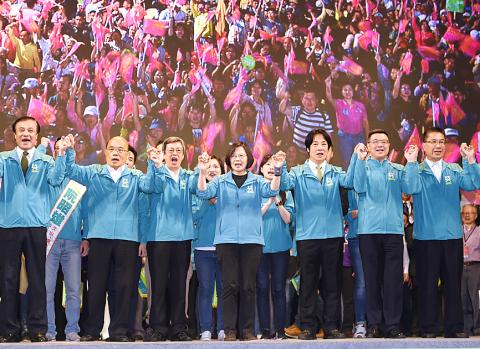
Photo: Fang Pin-chao, Taipei Times
“This will pave the way for better governance and rally all the forces of reform to work together,” she added.
“Right at the beginning of the [re-election] campaign, my only conviction was to win the election to safeguard Taiwan, as is the president’s duty,” she said. “Competition within our party has made us stronger. Now we unite in partnership to forge the strongest combination.”
Lai has had an accomplished political career, and he has a strong belief in and commitment to the future of Taiwan, she added.
“The Chinese Nationalist Party’s [KMT] presidential candidate has used every opportunity to vilify us, using derogatory language to attack us,” Tsai said.
“I must say, the KMT has absolutely no understanding of democracy and its values, and what it means to come together in unity. Progress comes from competition. No matter how intense the competition, in the end our party can remain unified,” she said.
Thanking Chen, Tsai said that he has “served as my deputy with distinction. He is always filled with warmth and patience, and took on troublesome tasks to fix them so we could overcome many difficulties.”
In his speech, Lai said he had accepted Tsai’s offer because he feels she is sincere and the ticket would meet the public’s expectations.
“In this darkest hour, we are joining together to safeguard Taiwan, to maintain our beacon of democracy as a leading light for Hong Kong and to illuminate the world,” he said.
“In the face of a China, which is closing in at every stage and warning signs from Hong Kong, what can the Democratic Progressive Party in next year’s critical election battle give the people of Taiwan? Isn’t our most important mission to unite and defend Taiwan?” he said.
“As long as Taiwan wins, there will be no losers, but if Taiwan loses, then there will be no winners,” he added.
“My ideals and my values remain unchanged,” Lai said as he talked about challenging Tsai in the DPP primary.
“We are comrades within our party. Tsai is not my enemy and she is not my adversary. Together we have fought many battles and experienced hardships, and we will face many future challenges. However, now Taiwan needs us, and I will offer my heart and mind to fight this election,” he said.
The KMT said yesterday’s announcement was no surprise.
Lai has proclaimed himself a “pragmatic Taiwanese independence activist,” so Tsai’s decision to pick him suggests that “under Tsai’s ineffectual governance, she could only try to entice pro-Taiwan independence groups and seek support from the extremist edge of Taiwan’s political spectrum,” the party said in a statement.
Additional reporting by Lin Liang-sheng
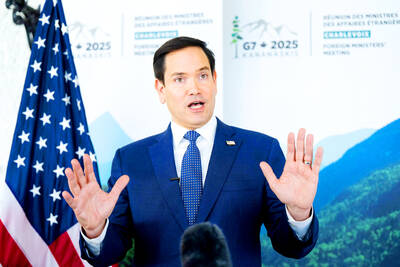
‘CROWN JEWEL’: Washington ‘can delay and deter’ Chinese President Xi Jinping’s plans for Taiwan, but it is ‘a very delicate situation there,’ the secretary of state said US President Donald Trump is opposed to any change to Taiwan’s “status quo” by force or extortion and would maintain that policy, US Secretary of State Marco Rubio told the Hugh Hewitt Show host on Wednesday. The US’ policy is to maintain Taiwan’s “status quo” and to oppose any changes in the situation by force or extortion, Rubio said. Hewitt asked Rubio about the significance of Trump earlier this month speaking with Taiwan Semiconductor Manufacturing Co (台積電) chairman C.C. Wei (魏哲家) at the White House, a meeting that Hewitt described as a “big deal.” Asked whether the meeting was an indication of the
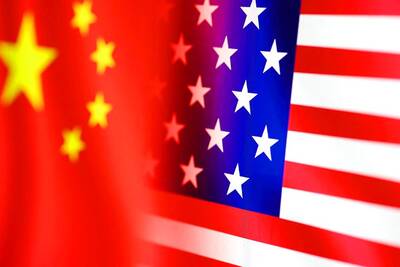
‘RELATIVELY STRONG LANGUAGE’: An expert said the state department has not softened its language on China and was ‘probably a little more Taiwan supportive’ China’s latest drills near Taiwan on Monday were “brazen and irresponsible threats,” a US Department of State spokesperson said on Tuesday, while reiterating Washington’s decades-long support of Taipei. “China cannot credibly claim to be a ‘force for stability in a turbulent world’ while issuing brazen and irresponsible threats toward Taiwan,” the unnamed spokesperson said in an e-mailed response to media queries. Washington’s enduring commitment to Taiwan will continue as it has for 45 years and the US “will continue to support Taiwan in the face of China’s military, economic, informational and diplomatic pressure campaign,” the e-mail said. “Alongside our international partners, we firmly
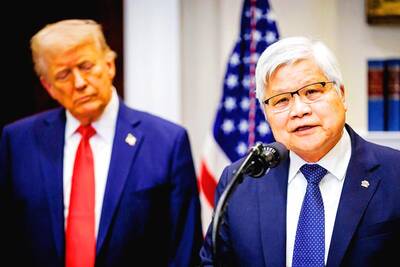
KAOHSIUNG CEREMONY: The contract chipmaker is planning to build 5 fabs in the southern city to gradually expand its 2-nanometer chip capacity Taiwan Semiconductor Manufacturing Co (TSMC, 台積電), the world’s biggest contract chipmaker, yesterday confirmed that it plans to hold a ceremony on March 31 to unveil a capacity expansion plan for its most advanced 2-nanometer chips in Kaohsiung, demonstrating its commitment to further investment at home. The ceremony is to be hosted by TSMC cochief operating officer Y.P. Chyn (秦永沛). It did not disclose whether Premier Cho Jung-tai (卓榮泰) and high-ranking government officials would attend the ceremony. More details are to be released next week, it said. The chipmaker’s latest move came after its announcement earlier this month of an additional US$100 billion
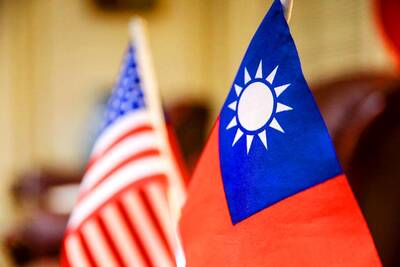
COUNTERING THE PLA: While the US should reinforce its relations with partners and allies, Taiwan must invest in strengthening its defenses as well, Phillip Davidson said If influence in the Indo-Pacific region is one of the US’ core interests, then Taiwan serves as a cornerstone of US economic and security influence in the region, former US Indo-Pacific Command commander admiral Phillip Davidson said on Thursday. “China’s ... strategy is to supplant the US leadership role in the international order ... and they’ve long said ... that they intend to do that by 2050,” Davidson told the National Review Institute’s Ideas Summit in Washington. Davidson said he had previously told US Senate hearings on China’s military activities and possible threats in the Indo-Pacific region that a Chinese invasion of